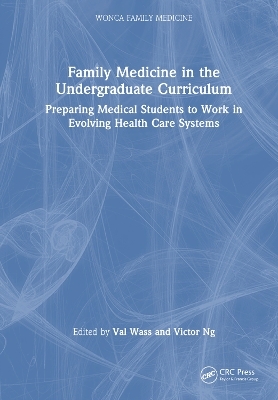
Family Medicine in the Undergraduate Curriculum
CRC Press (Verlag)
978-1-032-35185-8 (ISBN)
It has been recognised by governments and healthcare organisations worldwide that for Universal Healthcare in pursuit of Health for All under the Sustainable Development Goals to be achieved, effective primary care that is integrated, accessible, and affordable for everyone is essential.
This practical guide is the first designed specifically to support those planning and conducting family medicine/primary care education within medical schools around the world. It offers medical educators a collection of concise easy to follow chapters, guiding the reader through the curriculum requirements with key references for further detail. Plain English and practical, deliverable advice, adaptable to different contexts, ensures the content is accessible to those educating medical students in any country, while the structure within sections ensures that family medicine doctors and educators can dip into chapters relevant to their roles, for example curriculum design for academic educators or teaching methods for those educating in clinical practice.
Key Features
■ The first “how-to” guide dedicated to effective integration of family medicine teaching into medical school curricula
■ Offers a strong evidence-based framework for integrating family medicine into medical schools
■ Wide in scope, for academics and educationalists at all levels and in all geographies, reflecting and embracing the experience and variation in family medicine across the globe to produce pragmatic and effective information on which medical schools can base change
■ Step-by-step introduction to the processes of literature review (establishing the existing knowledge base), choosing a topic, research questions, and methodology, conducting research, and disseminating results
■ Supported by the WONCA Working Party on Education
The book is edited and authored by members of the World Organization of Family Doctors (WONCA) Working Party on Education, which is ideally placed to offer a strong platform for medical schools to integrate family medicine whatever the local context, enabling all future doctors, whatever their career aspiration, to understand the importance of family medicine to health systems and holistic medicine and encourage family medicine doctors to inspire students to consider a career in the field.
Val Wass OBE FRCGP FRCP MHPE PhD Professor of Medical Education in Primary Care, Aberdeen University; Emeritus Professor of Medical Education, Faculty of Medicine & Health, Keele University, UK; Former Chair, WONCA Working Party on Education Victor Ng MD CCFP(EM) MHPE FCFP ICD.D Assistant Dean Schulich School of Medicine and Dentistry, Western Canada; Associate Director, The College of Family Physicians of Canada; Chair, WONCA Working Party on Education
Section I - Integrating FM into the UG curriculum: Seizing the opportunity
Changing healthcare: Building the evidence for generalism
Defining family medicine
Social accountability
Developing an appropriate workforce for the future
Academic primary care: The importance of family medicine leaders and role models
Barriers for change and how to overcome these
Section II - What to aim for: Principles of curriculum design
Humanism in family medicine
Addressing population needs
Addressing patient and family needs
Competency-based curricula
Designing an integrated curriculum
Values-based education: Integrating professionalism into the curriculum
The formal, informal, and hidden curricula
Section III - Integrating FM into the curriculum: how to achieve this
Selecting for medical school entry: Nature or nurture?
Early exposure to family medicine
Family medicine placements: Apprenticeship learning
Longitudinal integrated clerkships
Interprofessional learning
Experiential learning for undergraduate medical students
Section IV - Teaching and learning: Methodologies
Blended learning
Clinical reasoning
Communication skills
Clinical and procedural skills
Handling risk, uncertainty, and complexity
Well-being
Supervision, mentorship, and coaching
Assessing clinical competency
Section V - Assessment
The principles of feedback
Principles of assessment and assessment tools
Struggling students and fitness to practise
Quality improvement and evaluation
Section VI - Evaluating teaching and learning across the curriculum
Evidence-based practice: Medical education research
Faculty development and continuous professional development
| Erscheinungsdatum | 10.10.2023 |
|---|---|
| Reihe/Serie | WONCA Family Medicine |
| Zusatzinfo | 16 Tables, black and white; 8 Line drawings, color; 10 Line drawings, black and white; 8 Illustrations, color; 10 Illustrations, black and white |
| Verlagsort | London |
| Sprache | englisch |
| Maße | 174 x 246 mm |
| Gewicht | 820 g |
| Themenwelt | Studium ► Querschnittsbereiche ► Prävention / Gesundheitsförderung |
| Sozialwissenschaften ► Pädagogik ► Erwachsenenbildung | |
| ISBN-10 | 1-032-35185-3 / 1032351853 |
| ISBN-13 | 978-1-032-35185-8 / 9781032351858 |
| Zustand | Neuware |
| Informationen gemäß Produktsicherheitsverordnung (GPSR) | |
| Haben Sie eine Frage zum Produkt? |
aus dem Bereich


